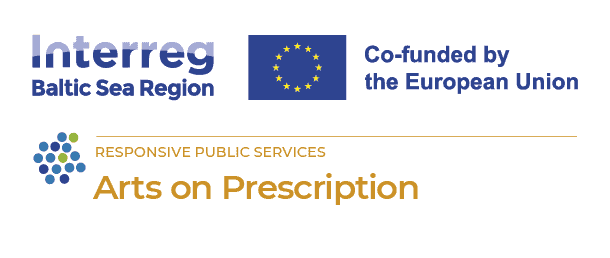
Insights from the Swedish pilot programme*
23 August 2024
About 40 residents of the Region Norrbotten have had the opportunity to participate in the Swedish Arts on Prescription pilot programme. The programme – called Kultur på recept in the Swedish case study – is organised by the Region Norrbotten and the Sunderby Folk High School in the context of the Interreg BSR project “Arts on Prescription in the Baltic Sea Region”.
One of the participants is Henrik Wikström, 29 years old, who works as an ST doctor at Sandens Health Center in Boden. When he suffered from depression last fall and was put on sick leave, he applied to participate.
“It was good for me to get out and be forced to do something. I got some kind of creative release”, Henrik Wikström says.
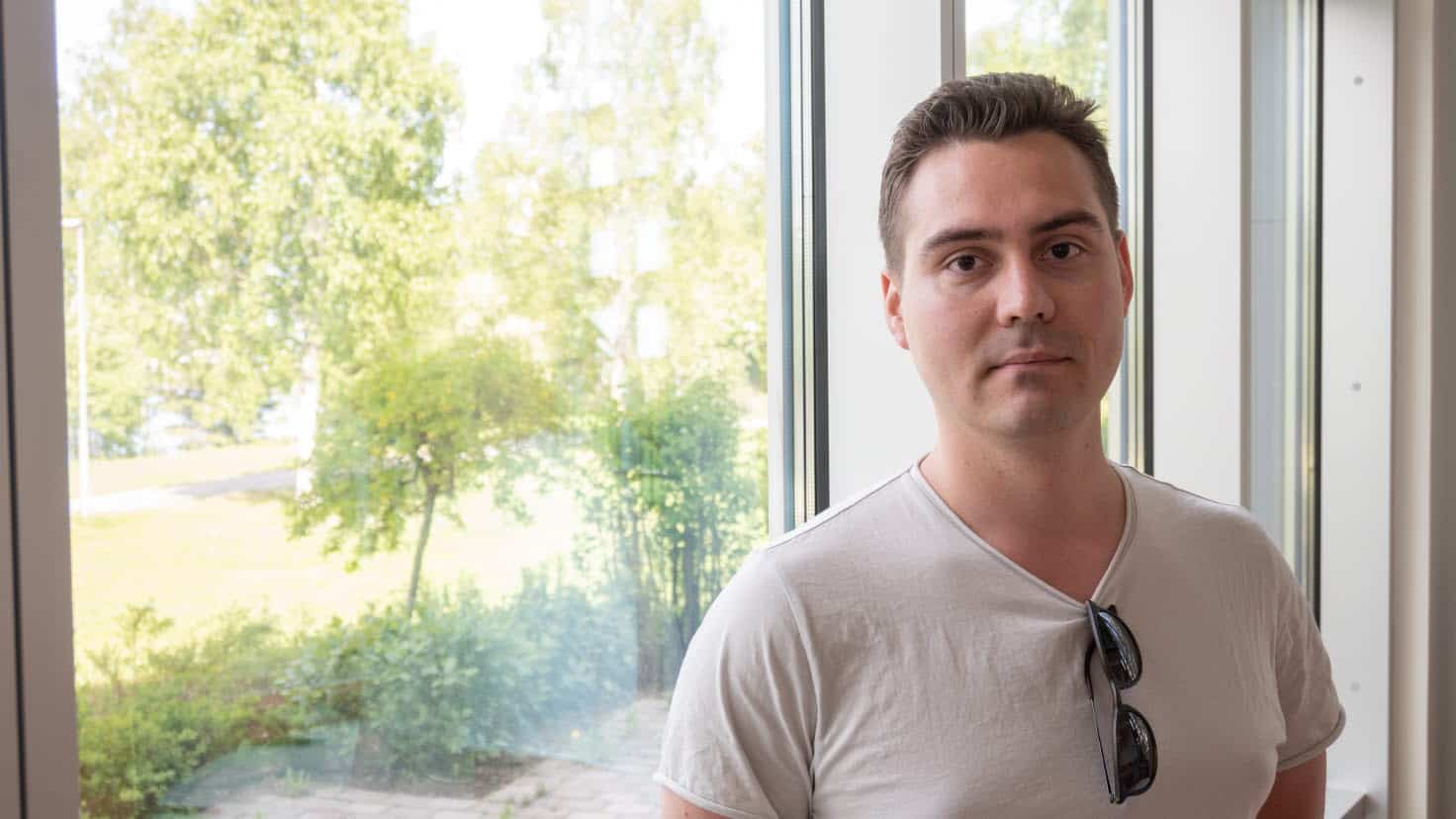
Henrik Wikström experienced a depression last fall. “Kultur på recept” became a way for him to start feeling better. © Photo: Ulrika Vallgårda/Yours
Arts on Prescription is meant to help people who are on sick leave, long-term unemployed, or NEET (Not in Education, Employment, or Training) find a path to better well-being and, hopefully, return to work either part-time or full-time.
“Some of the people we target have dropped out of school, become so-called NEET, and have never even started working”, says Susanne Lindquist, one of the project coordinators at Region Norrbotten.
Almost a year and a half , Region Norrbotten and Sunderby Folk High School participate in the project co-funded by the European Union. In the frame of the Interreg BSR project, the Arts on Prescription (AoP) concept is tested and evaluated in seven regions and cities in Denmark, Germany, Poland, Latvia and Sweden. Read more about the AoP concept in this news article.
At the turn of the year 2024, the project enters its final phase, with the aim to integrate the AoP concept in the regions regular health care provision on a long-term. The EU fund’s money lasts until the end of 2025, but if the concept is to continue beyond that, it must be funded with local resources.
Skilled facilitators
In early June 2024, the project’s steering group in Sweden held a workshop with politicians and officials from the region and municipalities, the Coordination Association, and project coordinators from Sunderby Folk High School and the municipality. This was to jointly determine how the implementation should proceed.
About 40 people from Luleå and Boden, many of whom suffer from mild to moderate mental illness, sometimes combined with long-term pain, have had the chance to participate in Arts on Prescription pilot programme over the past two semesters. They met in two groups, one in Boden and one in Luleå, twice a week for nine weeks, and during these sessions, they tried out various forms of art and movement to music. All sessions were led by experienced and knowledgeable instructors (culture and art facilitators) who work daily as professional artists, art educators, and dance teachers.
Valuable Experience
Henrik Wikström also participated in the workshop organised by the steering group and opened the workshop by sharing his personal experience with Arts on Prescription: “I have had quite a few depressive periods in my life. Previously, I managed them myself, but in August, I was put on sick leave for the first time.”
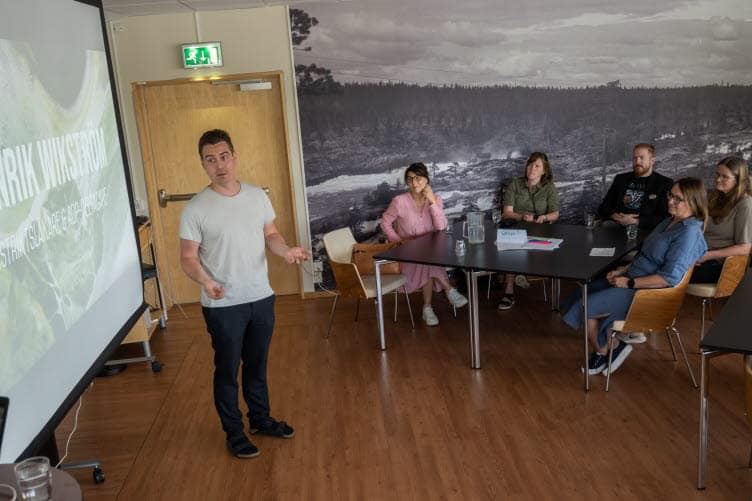
During the workshop, Henrik Wikström shared his personal experiences with “Kultur på recept”. © Photo: Ulrika Vallgårda/Yours
He saw an Instagram post about Arts on Prescription and personally inquired if he could join: “I’m interested in art and culture, so I saw it as a chance to develop my creative side. I also think it’s beneficial for healthcare staff to gain insight into what they recommend to patients”, he says.
Letting Go of Perfectionism
Henrik Wikström believes that his mental health struggles are related to a personal trait he felt he needed to work on: “I’m meticulous in a way and find it hard not to always do my best”, he explains.
Through the project, he was forced to challenge himself in activities he didn’t excel at, which made him let go of both perfectionism and pride: “We did things I’m terrible at: painting, making collages, sculpting, working with natural materials, and moving to music.”
The first few weeks were tough, not just because the course was challenging but also because he was struggling with his illness. He had low self-confidence and battled strong self-criticism. But eventually, he managed to let go of the pressure on himself and began creating.
Less Worry
Now, he works full-time again and has considered continuing with drawing and possibly ceramics: “I’ve actually bought some art supplies. What surprised me was that I turned out to be quite okay at design with clay, and I’d like to do that again.”
What Arts on Prescription helped him with was to lower the demands he placed on himself, not just during the programme, but in general—including in his professional life: “Not that I’d say I’m worse at meeting patients or providing care, but rather I’ve let go of the demands to complete all the administration the same day and to give everyone treatment as soon as they come through the door, unless necessary.”
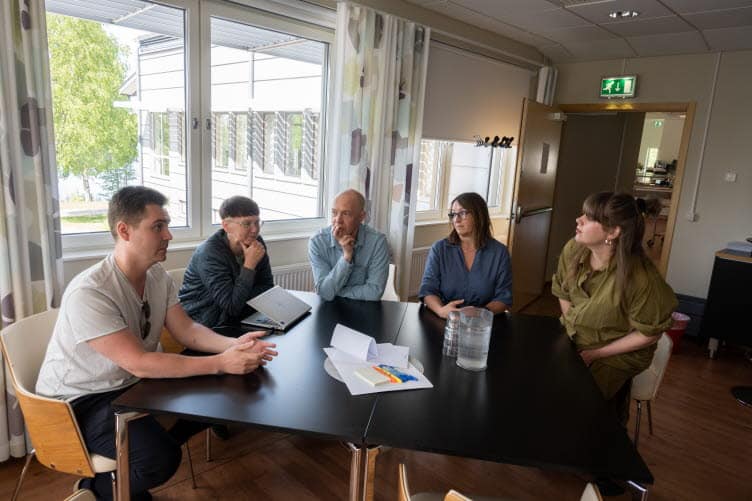
Henrik Wikström, ST doctor and former participant in “Kultur på recept” was invited to share his experiences with project coordinators Catharina Ljungcrantz and Elias Sandling from Sunderby Folk High School, and Susanne Lundquist and Marie Tuvesson from Region Norrbotten. © Photo: Ulrika Vallgårda/Yours
He also feels that he has gotten better at leaving work at work when he goes home and not dwelling too much on his patients during his free time.
He gladly recommends the programme to his patients whom he thinks would benefit from it: “I’m probably the doctor in Norrbotten who has referred the most patients to Arts on Prescription.”
A Successful Method
One of the project coordinators is Susanne Lindquist, who works in Division Nära (Near), which includes primary care. In this project, she has also worked with adult psychiatry and closely collaborates with the region’s cultural unit. She sees significant benefits in making Arts on Prescription a permanent programme of the regions health care provision: “Today, there is a lot of research showing that it’s a successful method, and we also see that several of those who participated have been able to return to work afterward.”
Half of the participants – most of them on sick leave – were recommended the programme by rehabilitation coordinators working at health centers and in psychiatry. Other participants – for various reasons far from the labor market – joined the programme via the Coordination Association of Southern Norrbotten, a cooperative organisation for the Social Insurance Agency, the Public Employment Service, Municipal Social Services, and Region Norrbotten.
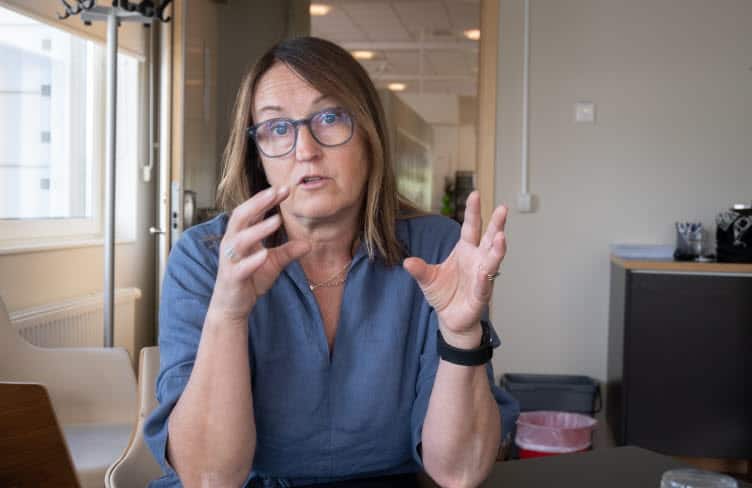
Susanne Lindquist sees good results and hopes that Arts on Prescription will become a permanent part of Region Norrbotten’s supportive toolkit for patients. © Photo: Ulrika Vallgårda/Yours
Susanne Lindquist believes that healthcare needs different tools when working with long-term sick leave, people with mental illness, and NEET individuals: “Not all tools suit everyone, but ‘Arts on Prescription’ can be experienced as more enjoyable and less demanding than many other options. Yet, it can help bring structure to life, to start getting up in the mornings, and to find context and meaning.”
Several regions are moving towards implementing it, some further along than others: “Part of the project is also to create collaborations, which we have done with the regions of Jämtland-Härjedalen, Västernorrland, and Västerbotten”, she says.
No Formal Referral Requirements
Formally, it’s not a prescription in the same sense as prescribing medication, and there is also no formal referral requirement; any primary healthcare professional can provide information and a recommendation to patients to apply for Arts on Prescription. A specialised link worker – who acts as a primary contact point both for patients and physicians and who collaborate with patients to determine and co-design the service that individuals might benefit from the most – receives the expressions of interest and decides respectively refers participants to the Arts on Prescription programme. The link workers could be an individual or a team of social care workers, community workers, nurses or also an organisation, such as an NGO. More information on the organisational structure and characteristics of the Arts on Prescription concept can be found here.
Important Workforce
The goal from the healthcare side is both for more people to feel better and for more people to be able to work. Susanne Lindquist refers to both the current sick leave figures in the Region Norrbotten and the skills supply demands that the region simultaneously faces: “Everyone is needed in the labor market now during the green transition”, she states.
The last out of three pilot programme cycles of Arts on Prescription will be conducted in autumn 2024: “Then the major implementation year begins in 2025, also funded by the EU fund”, says Susanne Lindquist. But after that, she and the others in the project hope that the Region Norrbotten will continue with Arts on Prescription with its own financing, possibly together with municipalities and other Swedish actors.
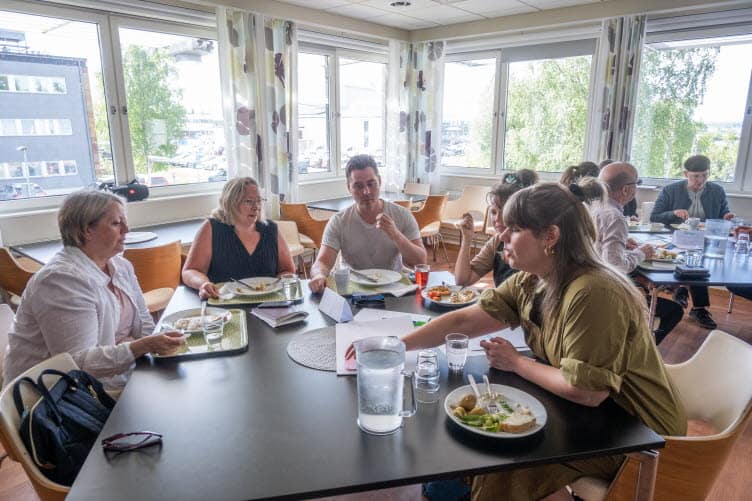
During the workshop, there was a discussion on how Arts on Prescription programmes could be implemented into the regular regional or national health care provision system. © Photo: Ulrika Vallgårda/Yours
Camilla Brännström, head of primary care in Luleå and Boden and chair of the steering group for Arts on Prescription in Region Norrbotten, believes in the concept: “I dare not speculate on the future funding, but I believe in the concept and in collaboration, that several actors need to come together. It could be the region, the municipalities, folk high schools, and others.”
Seeing Collaboration Opportunities
Glenn Berggård, vice-chairman of the regional board, is also part of the steering group: “I wrote a political proposal on Arts on Prescription to the regional council five or six years ago, so I definitely believe in it”, he says.
Do you think there is a chance to continue when the EU fund no longer helps with the money?
“Yes, I want to believe so. Just as physical activity on prescription has become fully implemented and established, I think ‘Arts on Prescription’ can be too.”
Evelina Rydeker, municipal commissioner in Luleå, is another workshop participant and sees it as possible that the municipality may want to enter into a collaboration: “We have several cultural institutions and areas that could be involved in the collaboration. This includes the School of Culture, which already collaborates with the region when it comes to culture as a health-promoting activity, such as Dance for Health. We need to work preventively and get involved via the Student Health Service”, she says.
*Disclaimer: This is an edited translation of the Swedish news post developed by our project partner, the Region Norrbotten. The original news was published on 2024-06-10 at: https://www.norrbotten.se/sv/region-norrbottens-nyhetsarkiv/st-lakaren-henrik-provade-pa-kultur-pa-recept/, © Swedish text and photos: Ulrika Vallgårda/Yours





